- Home
- Jhumpa Lahiri
The Namesake Page 9
The Namesake Read online
Page 9
"I ordered it from the bookstore, just for you," his father says, his voice raised in order to be heard over the music. "It's difficult to find in hardcover these days. It's a British publication, a very small press. It took four months to arrive. I hope you like it."
Gogol leans over toward the stereo to turn the volume down a bit. He would have preferred The Hitchhiker's Guide to the Galaxy, or even another copy of The Hobbit to replace the one he lost last summer in Calcutta, left on the rooftop of his father's house in Alipore and snatched away by crows. In spite of his father's occasional suggestions, he has never been inspired to read a word of Gogol, or any Russian writer, for that matter. He has never been told why he was really named Gogol, doesn't know about the accident that had nearly killed his father. He thinks his father's limp is the consequence of an injury playing soccer in his teens. He's been told only half the truth about Gogol: that his father is a fan.
"Thanks, Baba," Gogol says, eager to return to his lyrics. Lately he's been lazy, addressing his parents in English though they continue to speak to him in Bengali. Occasionally he wanders through the house with his running sneakers on. At dinner he sometimes uses a fork.
His father is still standing there in his room, watching expectantly, his hands clasped together behind his back, so Gogol flips through the book. A single picture at the front, on smoother paper than the rest of the pages, shows a pencil drawing of the author, sporting a velvet jacket, a billowy white shirt and cravat. The face is foxlike, with small, dark eyes, a thin, neat mustache, an extremely large pointy nose. Dark hair slants steeply across his forehead and is plastered to either side of his head, and there is a disturbing, vaguely supercilious smile set into long, narrow lips. Gogol Ganguli is relieved to see no resemblance. True, his nose is long but not so long, his hair dark but surely not so dark, his skin pale but certainly not so pale. The style of his own hair is altogether different—thick Beatle-like bangs that conceal his brows. Gogol Ganguli wears a Harvard sweatshirt and gray Levi's corduroys. He has worn a tie once in his life, to attend a friend's bar mitzvah. No, he concludes confidently, there is no resemblance at all.
For by now, he's come to hate questions pertaining to his name, hates having constantly to explain. He hates having to tell people that it doesn't mean anything "in Indian." He hates having to wear a nametag on his sweater at Model United Nations Day at school. He even hates signing his name at the bottom of his drawings in art class. He hates that his name is both absurd and obscure, that it has nothing to do with who he is, that it is neither Indian nor American but of all things Russian. He hates having to live with it, with a pet name turned good name, day after day, second after second. He hates seeing it on the brown paper sleeve of the National Geographic subscription his parents got him for his birthday the year before and perpetually listed in the honor roll printed in the town's newspaper. At times his name, an entity shapeless and weightless, manages nevertheless to distress him physically, like the scratchy tag of a shirt he has been forced permanently to wear. At times he wishes he could disguise it, shorten it somehow, the way the other Indian boy in his school, Jayadev, had gotten people to call him Jay. But Gogol, already short and catchy, resists mutation. Other boys his age have begun to court girls already, asking them to go to the movies or the pizza parlor, but he cannot imagine saying, "Hi, it's Gogol" under potentially romantic circumstances. He cannot imagine this at all.
From the little he knows about Russian writers, it dismays him that his parents chose the weirdest namesake. Leo or Anton, he could have lived with. Alexander, shortened to Alex, he would have greatly preferred. But Gogol sounds ludicrous to his ears, lacking dignity or gravity. What dismays him most is the irrelevance of it all. Gogol, he's been tempted to tell his father on more than one occasion, was his father's favorite author, not his. Then again, it's his own fault. He could have been known, at school at least, as Nikhil. That one day, that first day of kindergarten, which he no longer remembers, could have changed everything. He could have been Gogol only fifty percent of the time. Like his parents when they went to Calcutta, he could have had an alternative identity, a B-side to the self. "We tried," his parents explain to friends and relatives who ask why their son lacks a good name, "but he would only respond to Gogol. The school insisted." His parents would add, "We live in a country where a president is called Jimmy. Really, there was nothing we could do."
"Thanks again," Gogol tells his father now. He shuts the cover and swings his legs over the edge of the bed, to put the book away on his shelves. But his father takes the opportunity to sit beside him on the bed. For a moment he rests a hand on Gogol's shoulder. The boy's body, in recent months, has grown tall, nearly as tall as Ashoke's. The childhood pudginess has vanished from his face. The voice has begun to deepen, is slightly husky now. It occurs to Ashoke that he and his son probably wear the same size shoe. In the glow of the bedside lamp, Ashoke notices a scattered down emerging on his son's upper lip. An Adam's apple is prominent on his neck. The pale hands, like Ashima's, are long and thin. Ashoke wonders how closely Gogol resembles himself at this age. But there are no photographs to document Ashoke's childhood; not until his passport, not until his life in America, does visual documentation exist. On the night table Ashoke sees a can of deodorant, a tube of Clearasil. He lifts the book from where it lies on the bed between them, running a hand protectively over the cover. "I took the liberty of reading it first. It has been many years since I have read these stories. I hope you don't mind."
"No problem," Gogol says.
"I feel a special kinship with Gogol," Ashoke says, "more than with any other writer. Do you know why?"
"You like his stories."
"Apart from that. He spent most of his adult life outside his homeland. Like me."
Gogol nods. "Right."
"And there is another reason." The music ends and there is silence. But then Gogol flips the record, turning the volume up on "Revolution 1."
"What's that?" Gogol says, a bit impatiently.
Ashoke looks around the room. He notices the Lennon obituary pinned to the bulletin board, and then a cassette of classical Indian music he'd bought for Gogol months ago, after a concert at Kresge, still sealed in its wrapper. He sees the pile of birthday cards scattered on the carpet, and remembers a hot August day fourteen years ago in Cambridge when he held his son for the first time. Ever since that day, the day he became a father, the memory of his accident has receded, diminishing over the years. Though he will never forget that night, it no longer lurks persistently in his mind, stalking him in the same way. It no longer looms over his life, darkening it without warning as it used to do. Instead, it is affixed firmly to a distant time, to a place far from Pemberton Road. Today, his son's birthday, is a day to honor life, not brushes with death. And so, for now, Ashoke decides to keep the explanation of his son's name to himself.
"No other reason. Good night," he says to Gogol, getting up from the bed. At the door he pauses, turns around. "Do you know what Dostoyevsky once said?"
Gogol shakes his head.
"'We all came out of Gogol's overcoat.'"
"What's that supposed to mean?"
"It will make sense to you one day. Many happy returns of the day."
Gogol gets up and shuts the door behind his father, who has the annoying habit of always leaving it partly open. He fastens the lock on the knob for good measure, then wedges the book on a high shelf between two volumes of the Hardy Boys. He settles down again with his lyrics on the bed when something occurs to him. This writer he is named after—Gogol isn't his first name. His first name is Nikolai. Not only does Gogol Ganguli have a pet name turned good name, but a last name turned first name. And so it occurs to him that no one he knows in the world, in Russia or India or America or anywhere, shares his name. Not even the source of his namesake.
***
The following year Ashoke is up for a sabbatical, and Gogol and Sonia are informed that they will all be going to Calcutta for eight months. When his parent
s tell him, one evening after dinner, Gogol thinks they're joking. But then they tell them that the tickets have already been booked, the plans already made. "Think of it as a long vacation," Ashoke and Ashima say to their crestfallen children. But Gogol knows that eight months is no vacation. He dreads the thought of eight months without a room of his own, without his records and his stereo, without friends. In Gogol's opinion, eight months in Calcutta is practically like moving there, a possibility that, until now, has never even remotely crossed his mind. Besides, he's a sophomore now. "What about school?" he points out. His parents remind him that in the past his teachers have never minded Gogol missing school now and again. They've given him math and language workbooks that he's ignored, and when he returns, a month or two later, they praise him for keeping up with things. But Gogol's guidance counselor expresses concern when Gogol informs him that he will be missing the entire second half of the tenth grade. A meeting is called with Ashima and Ashoke to discuss the options. The guidance counselor asks if it's possible to enroll Gogol in one of the American Schools in India. But the nearest one is in Delhi, over eight hundred miles from Calcutta. The guidance counselor suggests that perhaps Gogol could join his parents later, after the school year ends, stay with a relative until June. "We have no relatives in this country," Ashima informs the guidance counselor. "That is why we are going to India in the first place."
And so after barely four months of tenth grade, after an early supper of rice and boiled potatoes and eggs that his mother insists they eat even though they will be served another supper on the plane, he is off, geometry and U.S. history books packed into his suitcase, which is locked, along with the others, with padlocks and bound with ropes, labeled with the address of his father's house in Alipore. Gogol always finds the labels unsettling, the sight of them making him feel that his family doesn't really live on Pemberton Road. They depart Christmas Day, driving with their massive collection of luggage to Logan when they should be home opening gifts. Sonia is morose, running a slight fever from her typhoid shot, still expecting, when she enters the living room in the morning, to see a tree trimmed with lights. But the only thing in the living room is debris: price tags from all the gifts they've packed for their relatives, plastic hangers, cardboard from shirts. They shiver as they leave the house, without coats or gloves; they won't need them where they're going, and it will be August by the time they return. The house has been rented to some American students his father has found through the university, an unmarried couple named Barbara and Steve. In the airport Gogol stands in the check-in line with his father, who is dressed in a jacket and tie, clothes he still thinks to wear when riding on planes. "Four in the family," his father says when it is their turn, producing two U.S. passports and two Indian ones. "Two Hindu meals, please."
On the plane Gogol is seated several rows behind his parents and Sonia, in another section altogether. His parents are distressed by this, but Gogol is secretly pleased to be on his own. When the stewardess approaches with her cart of beverages he tries his luck and asks for a Bloody Mary, tasting the metallic bite of alcohol for the first time in his life. They fly first to London, and then to Calcutta via Dubai. When they fly over the Alps, his father gets out of his seat to take pictures of the snowcapped peaks through the window. On past trips, it used to thrill Gogol that they were flying over so many countries; again and again he would trace their itinerary on the map in the seat pocket below his tray and feel somehow adventurous. But this time it frustrates him that it is to Calcutta that they always go. Apart from visiting relatives there was nothing to do in Calcutta. He's already been to the planetarium and the Zoo Gardens and the Victoria Memorial a dozen times. They have never been to Disneyland or the Grand Canyon. Only once, when their connecting flight in London was delayed, did they leave Heathrow and take a double-decker bus tour of the city.
On the final leg of the trip there are only a few non-Indians left on the plane. Bengali conversation fills the cabin; his mother has already exchanged addresses with the family across the aisle. Before landing she slips into the bathroom and changes, miraculously in that minuscule space, into a fresh sari. A final meal is served, an herbed omelette topped with a slice of grilled tomato. Gogol savors each mouthful, aware that for the next eight months nothing will taste quite the same. Through the window he sees palm trees and banana trees, a damp, drab sky. The wheels touch the ground, the aircraft is sprayed with disinfectant, and then they descend onto the tarmac of Dum Dum Airport, breathing in the sour, stomach-turning, early morning air. They stop to wave back at the row of relatives waving madly from the observation deck, little cousins propped up on uncles' shoulders. As usual the Gangulis are relieved to learn that all their luggage has arrived, together and unmolested, and relieved further still when customs doesn't make a fuss. And then the frosted doors slide open and once again they are officially there, no longer in transit, swallowed by hugs and kisses and pinched cheeks and smiles. There are endless names Gogol and Sonia must remember to say, not aunt this and uncle that but terms far more specific: mashi and pishi, mama and maima, kaku and jethu, to signify whether they are related on their mother's or their father's side, by marriage or by blood. Ashima, now Monu, weeps with relief, and Ashoke, now Mithu, kisses his brothers on both cheeks, holds their heads in his hands. Gogol and Sonia know these people, but they do not feel close to them as their parents do. Within minutes, before their eyes Ashoke and Ashima slip into bolder, less complicated versions of themselves, their voices louder, their smiles wider, revealing a confidence Gogol and Sonia never see on Pemberton Road. "I'm scared, Goggles," Sonia whispers to her brother in English, seeking his hand and refusing to let go.
They are ushered into waiting taxis and down VIP Road, past a colossal landfill and into the heart of North Calcutta. Gogol is accustomed to the scenery, yet he still stares, at the short, dark men pulling rickshaws and the crumbling buildings side by side with fretwork balconies, hammers and sickles painted on their facades. He stares at the commuters who cling precariously to trams and buses, threatening at any moment to spill onto the street, and at the families who boil rice and shampoo their hair on the sidewalk. At his mother's flat on Amherst Street, where his uncle's family lives now, neighbors look from their windows and roofs as Gogol and his family emerge from the taxi. They stand out in their bright, expensive sneakers, American haircuts, backpacks slung over one shoulder. Once inside, he and Sonia are given cups of Horlick's, plates of syrupy, spongy rossogollas for which they have no appetite but which they dutifully eat. They have their feet traced onto pieces of paper, and a servant is sent to Bata to bring back rubber slippers for them to wear indoors. The suitcases are unlocked and unbound and all the gifts are unearthed, admired, tried on for size.
In the days that follow they adjust once again to sleeping under a mosquito net, bathing by pouring tin cups of water over their heads. In the mornings Gogol watches his cousins put on their white and blue school uniforms and strap water bottles across their chests. His aunt, Uma Maima, presides in the kitchen all morning, harassing the servants as they squat by the drain scouring the dirty dishes with ash, or pound heaps of spices on slabs that resemble tombstones. At the Ganguli house in Alipore, he sees the room in which they would have lived had his parents remained in India, the ebony four-poster bed on which they would have slept all together, the armoire in which they would have stored their clothes.
Instead of renting an apartment of their own, they spend eight months with their various relatives, shuttling from home to home. They stay in Ballygunge, Tollygunge, Salt Lake, Budge Budge, ferried by endless bumpy taxi rides back and forth through the city. Every few weeks there is a different bed to sleep in, another family to live with, a new schedule to learn. Depending on where they are, they eat sitting on red clay or cement or terrazzo floors, or at marble-topped tables too cold to rest their elbows on. Their cousins and aunts and uncles ask them about life in America, about what they eat for breakfast, about their friends at school. They l
ook at the pictures of their house on Pemberton Road. "Carpets in the bathroom," they say, "imagine that." His father keeps busy with his research, delivering lectures at Jadavpur University. His mother shops in New Market and goes to movies and sees her old school friends. For eight months she does not set foot in a kitchen. She wanders freely around a city in which Gogol, in spite of his many visits, has no sense of direction. Within three months Sonia has read each of her Laura Ingalls Wilder books a dozen times. Gogol occasionally opens up one of his textbooks, bloated from the heat. Though he's brought his sneakers with him, hoping to keep up with cross-country training, it is impossible, on these cracked, congested, chock-a-block streets, to run. The one day he tries, Uma Maima, watching from the rooftop, sends a servant to follow him so that Gogol doesn't get lost.
It's easier to surrender to confinement. On Amherst Street, Gogol sits at his grandfather's drawing table, poking through a tin full of dried-out nibs. He sketches what he sees through the iron window bars: the crooked skyline, the courtyards, the cobblestone square where he watches maids filling brass urns at the tube well, people passing under the soiled canopies of rickshaws, hurrying home with parcels in the rain. On the roof one day, with its view of Howrah Bridge in the distance, he smokes a bidi tightly rolled in olive green leaves with one of the ser vants. Of all the people who surround them at practically all times, Sonia is his only ally, the only person to speak and sit and see as he does. While the rest of the household sleeps, he and Sonia fight over the Walkman, over the melting collection of tapes Gogol recorded back in his room at home. From time to time, they privately admit to excruciating cravings, for hamburgers or a slice of pepperoni pizza or a cold glass of milk.
They are surprised, in the summer, to learn that their father has planned a trip for them, first to Delhi to visit an uncle, and then to Agra to see the Taj Mahal. It will be Gogol and Sonia's first journey outside of Calcutta, their first time on an Indian train. They depart from Howrah, that immense, soaring, echoing station, where barefoot coolies in red cotton shirts pile the Gangulis' Samsonite luggage on their heads, where entire families sleep, covered, in rows on the floor. Gogol is aware of the dangers involved: his cousins have told him about the bandits that lurk in Bihar, so that his father wears a special garment under his shirt, with hidden pockets to carry cash, and his mother and Sonia remove their gold jewels. On the platform they walk from compartment to compartment, looking for their four names on the passenger list pasted to the outside wall of the train. They settle onto their blue berths, the top two swinging down from the walls when it is time to sleep and held in place by sliding latches during the day. A conductor gives them their bedding, heavy white cotton sheets and thin woolen blankets. In the morning they look at the scenery through the tinted window of their air-conditioned car. As a result, the view, no matter how bright the day, is gloomy and gray.

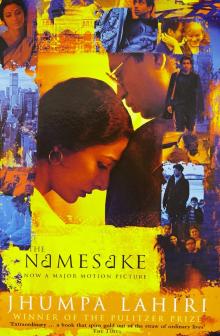 The Namesake
The Namesake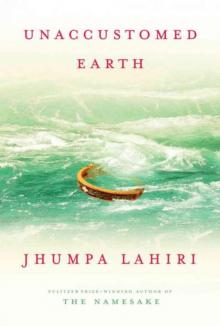 Nobody's Business
Nobody's Business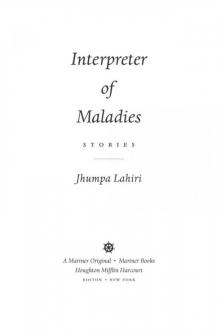 Interpreter of Maladies
Interpreter of Maladies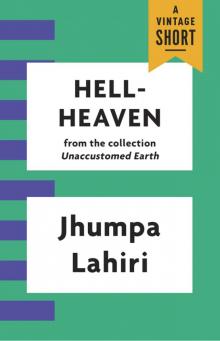 Hell-Heaven
Hell-Heaven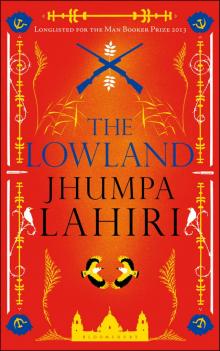 The Lowland
The Lowland Unaccustomed Earth
Unaccustomed Earth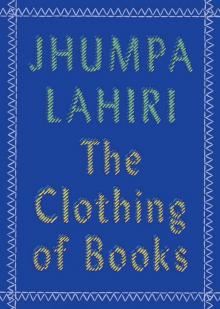 The Clothing of Books
The Clothing of Books In Other Words
In Other Words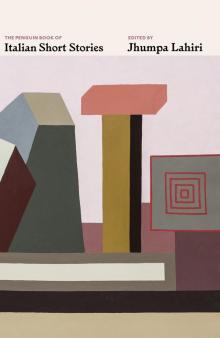 The Penguin Book of Italian Short Stories
The Penguin Book of Italian Short Stories